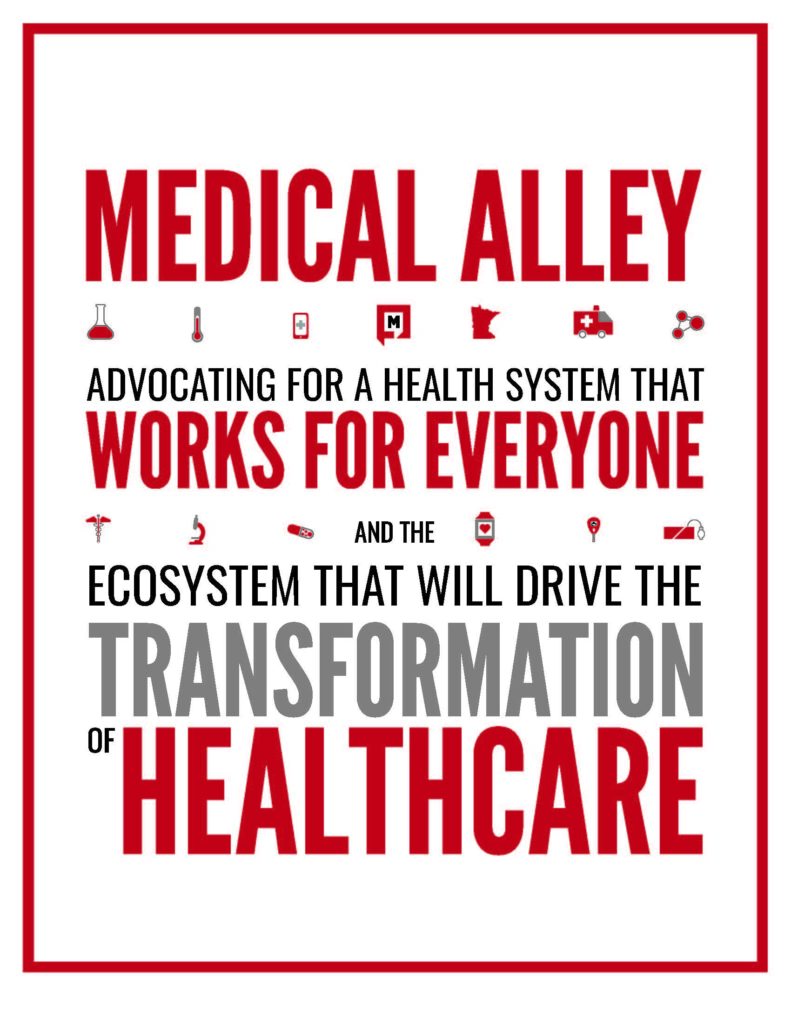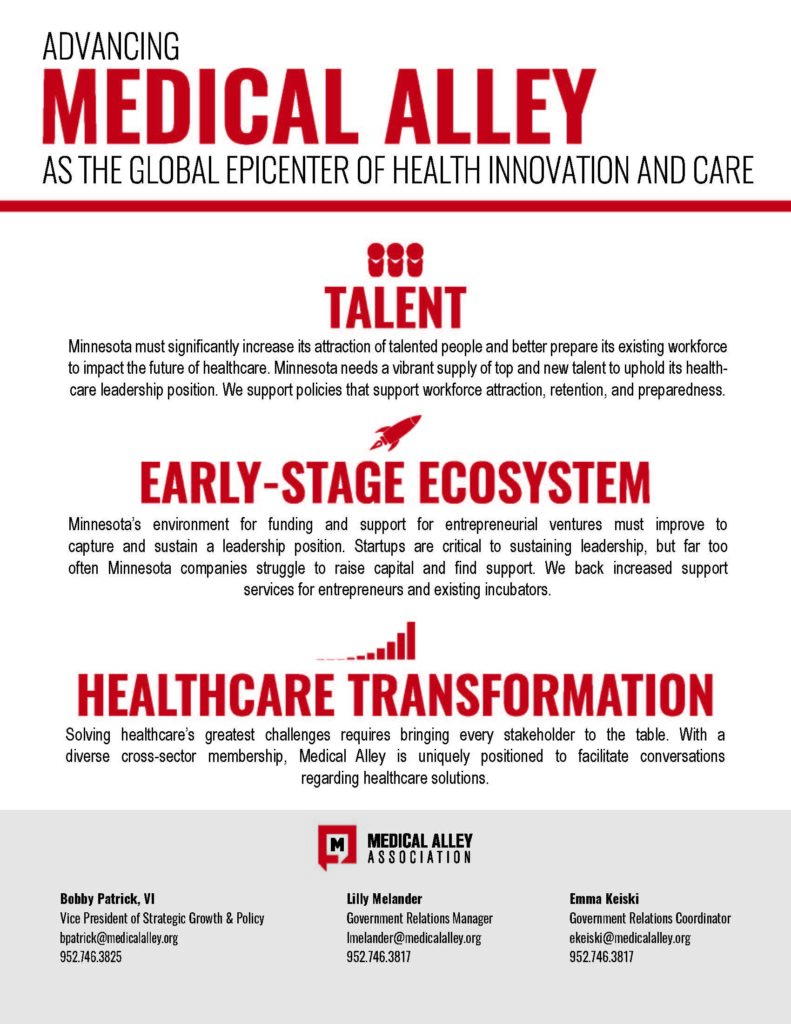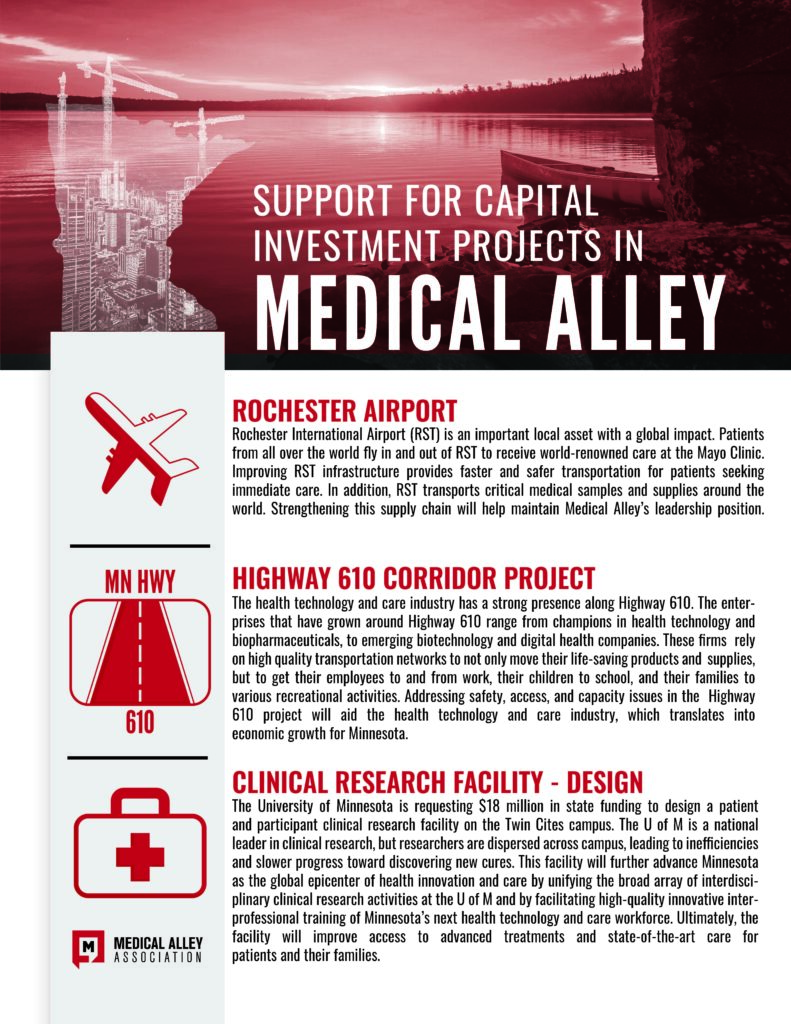Legislative Preview
The 2020 Minnesota legislative session is set to begin today and Medical Alley Day at the Capitol is right around the corner. Register now to share your story with legislators. This is a great opportunity for you to engage local legislative leaders and demonstrate how your work elevates the region as The Global Epicenter of Health Innovation and Care™. This event will be a highlight of what is sure to be a packed session.
With only four months until adjournment, legislators will be seeking to maximize their effectiveness and messaging heading into an election with each and every one of them on the ballot. Without the need to balance the budget, lawmakers will have the opportunity to focus on other policy issues. That is not to say the budget won’t play a role – with a larger than $1 billion estimated surplus it certainly will – but with the potential restructuring at the Department of Human Services and several outstanding issues from 2019, it certainly will not be the focus of this legislative session. We anticipate the following issues to dominate the discourse at the Capitol.
Capital Investment Bill
Historically, the Legislature dedicates odd-years to the state operating budget and even-years for bonding. Although 2019 was not what is considered a “bonding” session, the 2019 Legislature did consider a borrowing and construction package. Walz proposed a $1.2 billion bonding package, while the DFL- controlled House floated a $1.6 billion plan. The GOP-controlled Senate did not want to consider a bonding proposal in an odd-year.
The eventual deal struck by the Governor, House Speaker and Senate Majority Leader last session called for a $500 million bonding bill. However, bonding bills require a 60 percent majority, and the House minority was able to exert its influence on the legislation, and the bill failed.
As 2020 is a “bonding year” by practice, the capital investment bill will dominate debate at the Legislature. The total amount presented to the 2020 session of the Legislature is likely to be in the range of $1 to $3.5 billion, but everyone wants a piece and the total value of the submitted requests came in at $5.3 billion.
The Governor released his $2 billion bonding proposal mid-January. Leaders in both bodies of the Legislature say they want to pass a bonding bill this year but differ on the amount. The House Speaker supports a robust bonding bill, while the House Minority Leader supports a proposal closer to $1 billion. The Senate Majority Leader said he is interested in passing a bill that is similar in size to past bills, which would be less than $1 billion.
Medical Alley Association will advocate for three bonding projects in 2020 that help elevate Minnesota. Jump to our legislative agenda to learn more.
DHS
After the bonding bill, the recent news surrounding the Department of Human Services (DHS) will be the next largest topic of discussion. DHS is the largest state agency with an $18.5 billion biennial budget that touches more than 1 million Minnesotans through its programs.
Since July, DHS had a series of resignations in top leadership, revelations of nearly $80 million in improper payments and allegations of retaliation against internal whistleblowers. Over the course of session, policymakers will consider how to deal with the improper payments and debate proposals for restructuring the state agency.
Election year
2020 is the year of elections. Members from both bodies of Minnesota’s congressional delegation and state Legislature are up for reelection November 2020. Several members of the State Legislature already announced they will retire after this biennium. For the remaining legislators, electioneering will certainly affect legislative outcomes in the 2020 session. Additionally, the election will have implications for redistricting, as legislators, along with the governor, will be tasked with drawing legislative and congressional maps for the next 10 years following the 2020 census.
A special election was held February 4 to fill the House District 30A seat due to the retirement of Rep. Nick Zerwas and the House District 60A seat due to the passing of Rep. Diane Loeffler. Both The DFL and GOP maintained their respective seats in the special election. Democrat Sydney Jordan was elected to House District 60A and Republican Paul Novotny was elected to House District 30A.
Prescription Drugs
Legislators will continue to discuss drug pricing in 2020. A bipartisan House and Senate group met over the interim to discuss a state emergency insulin program. The group agrees a program is necessary, but differ on eligibility requirements, the extent of the supply for patients who qualify, and the role of drug manufacturers in the program.
Medical Alley also monitored the Attorney General’s Advisory Task Force on Lowering Pharmaceutical Drug Prices. The Attorney General charged the task force with understanding prescription drug pricing and to come up with multi-pronged strategies for lowering prices. We will continue to monitor this task force in 2020.
Marijuana
Following the national trend, legislators will likely debate the legalization and regulation of marijuana. House Democrats intend to introduce a plan to legalize recreational marijuana. Among the questions facing state officials are the tax, regulatory, law enforcement and economic impact of legal cannabis.
Ensuring Device Safety for Patients
Changes in how carcinogens are classified at the federal level caused alarm over the use of ethylene oxide (ETO) gas to sterilize medical devices. ETO is used to sterilize more than 20 billion U.S. medical devices each year. About 80% of the millions of pre-made surgical kits for specific procedures are treated with ETO. The FDA shared the public’s goal of reducing “overreliance” on ETO, but suddenly closing ETO sterilization facilities could compromise patient care and cause device shortages. We will monitor this issue closely.
Gun Laws
The Minnesota Legislature will continue the gun debate in 2020. Some are calling for expanding background checks and banning assault weapons, however, any major gun control legislation will likely be blocked by the Senate.
2019 Legislative Session
The 91st biennial session of the Minnesota Legislature convened on January 8, 2019, with a newly elected Democratic Governor, Former Congressman Tim Walz, and the only divided Legislature in the nation. The Democrats flipped the House majority, picking up 15 seats and swearing in 34 new members. The Senate was not on the ballot and remained in Republican control.
Setting the state’s FY 2020-2021 biennium budget was the main business before the Legislature in 2019. The February forecast estimated a $1 billion surplus so many thought the Legislature might end on time, but the Governor, House Speaker and Senate Majority Leader were still at odds on their budget guidelines in the final weeks of session.
The three leaders reached a budget deal the day before the Legislature was required to adjourn. However, this did not give the conference committees enough time to pass their budget bills. The Governor called a one-day special session for Friday, May 24 and in those 24 hours the Legislature passed the bills required to implement the state’s biennial budget.
Throughout 2019, guided by the blueprint laid out in Realizing the Vision, we were there tirelessly advocating on behalf of the health innovation and care community.
We helped deliver on a number of priorities important to Medical Alley companies, employees, and the patients they serve, including strengthening our early-stage ecosystem through reinstatement of the Angel Tax Credit Program and establishment of Launch Minnesota (aka The Minnesota Innovation Collaborative). We are already seeing the impact of some of these policy changes. Both the Angel Tax Credit and Launch Minnesota distributed credits and grants to the start-up community. 16 members of the Medical Alley Association benefited from the AITC money we secured in May and Launch Minnesota is now accepting grant applications.
Medical Alley also delivered on increasing the supply of talent by funding the SciTechsperience Internship Program; and helping legislators see the deficiencies in several other policies that would have hindered our business environment and the state’s competitiveness. In one of the other victories that will provide the most immediate impact, a new rare diseases council will be housed at the University of Minnesota, which will help patients and families affected by rare diseases by providing resources to them and by pushing forward groundbreaking research.
Interim
Advocacy efforts do not rest after session ends. Your Medical Alley Association stayed busy, continuing to meet with legislators and even bringing them into your companies. Legislative tours are a great way to show firsthand the good work you are doing for the health innovation and care community.
A major highlight of 2019 was the full repeal of the medical device excise tax. The medical device tax deters innovation, reduces employment, slows hiring plans, and freezes capital investments. Innovators now have the certainty they need to advance their life saving products.
Legislative Look forward
We appreciate your contribution to realizing the vision of Medical Alley as The Global Epicenter of Health Innovation and Care™.
This session we will work to maintain Medical Alley’s global leadership position. Our team will continue to advance Medical Alley as The Global Epicenter of Health Innovation and Care™ by focusing on talent, the early-stage ecosystem, and healthcare transformation.



